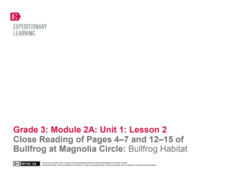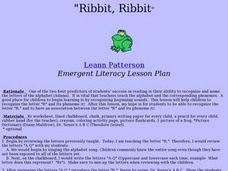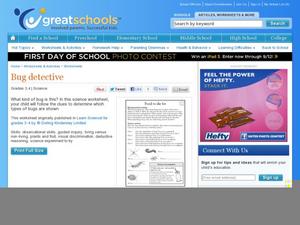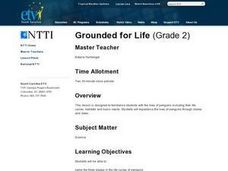Sea World
Ocean Discovery
Immerse your young marine biologists in the world of marine animals. The lesson includes several activities that are age-appropriate for preschoolers and kindergartners, including coloring pages, gluing feathers and sand onto paper...
EngageNY
Close Reading of Pages 4 - 7 and 12 - 15 of Bullfrog at Magnolia Circle: Bullfrog Circle
Scholars take part in a close reading of pages four through seven and 12-15 of the book, Bullfrog at Magnolia Circle: Bullfrog Circle by Deborah Dennard. Readers identify the story's main idea, list its key details, and examine...
Curated OER
Which Baby Animals Looks Unlike Their Parents?
Learners review the steps of the butterfly life cycle to show how the babies are different from the parents. This learning exercise is a graphic organizer with four fill in the blank statements.
Curated OER
Water Cycle Boogie
Learners explore the water cycle. They learn the "Water Cycle Boogie." Students create hats to represent the different parts of the cycle and learn hand motions to go with the words of the song. Learners practice singing the song and the...
Space Awareness
Star in a Box
What happens to stars as they get older? A simulation takes pupils through the life cycle of stars based on their masses. The resource introduces the Hertzsprung-Russell diagram and the common relationships and life cycle patterns observed.
The New York Times
Sequencing the Stages: Understanding H.I.V. Infection at the Molecular Level
How does HIV operate at the molecular level? Pupils discover the progression from a healthy immune cell to one infected with HIV, watch an animation of the HIV life cycle, and finally identify each of the stages with illustrations on...
Curated OER
Blue Crabs - The Blue Crab's Chesapeake Journey
A plethora of information about the blue crabs of Chesapeake Bay will amaze and delight your marine biologists. They learn, through direct instruction, about the characteristics and life cycle of this fascinating arthropod. A highlight...
Curated OER
Coral Reef Ecology
Students explore coral life cycles. In this coral ecosystems lesson, students view videos explaining the life cycle of coral, including examples of sexual and asexual reproduction. Students read a related article cooperatively in groups,...
Curated OER
Cells
Students are introduced to the life cycle of a cell. In groups, they identify and describe the function of organelles. They compare and contrast the differences and similarities between plant and animal cells as well. They complete a...
Curated OER
From Polliwog to Frog
Students examine how frogs change. In this life cycle lesson, students create a model to show how a frog changes throughout its life. Students will show the process of frog metamorphosis, from polliwog to adult frog.
Curated OER
Ribbit! Ribbit!
Learners research a frog's life cycle and habitat using books, the Internet and lecture. Students make origami frogs, write letters to Toad from Arnold Lobel's "Frog and Toad" and participate in a simulated camouflage activity.
Curated OER
The Cell Cycle
In this biology worksheet, students label 9 diagrams with the correct names. They also write short answers to 6 questions that follow.
Curated OER
Week 8 - Sea Life
Using a magnifier, mini marine biologists examine the barbules of a bird feather. They swirl the it into a mixture of oil and water and then re-examine the feather. After the activity, discuss how the oily feathers pose a problem to sea...
Curated OER
2nd Grade - Act. 25: Creature Creation
Create a creature using some of the characteristics of a real animal. Second graders will read a book from the "Froggy," series by Johnathan London to learn about the characteristics of frogs. After discussing and recording various...
Curated OER
Bug Detective
What happens when a living thing dies? After reading a paragraph of background knowledge on the life cycle of bugs, third and fourth graders work through four clues to figure out which bug is which. When they finish, they can study the...
Curated OER
Elementary Animal Classification
Students investigate eight basic animal groups, and identify the different groups through knowledge of animal characteristics, changes, and life cycles of each group.
Curated OER
Sunken Lesson: Animal Growth and Heredity Grade 5
This animal growth PowerPoint includes bulleted text organized into categories including cell division, mitosis, regeneration, sexual and asexual reproduction, life cycles, metamorphosis, and inherited traits. Diagrams are included in...
Curated OER
How Do Animals Grow and Change?
In this animal growth worksheet, students will write in the 3 steps in a salamander's life cycle, from egg to adult. This worksheet is a graphic organizer.
Curated OER
Science Jeopardy - The Earth Sciences
The earth sciences are the focus for this Jeopardy-style review game. Categories include geology, space, scientific investigation, meteorology, and oceanography. Diagrams and pictures are involved with most of the questions, making this...
Curated OER
Horseshoe Crab Fun
Marine biology masters will meet the horseshoe crab and red knot shore birds that feast upon the crab eggs. Begin with a discussion and then have learners write postcards from each animal detailing their migration trips. A few math...
Polar Trec
Animal Monitoring Introduction
Not only do mealworms taste great, they are also great for classroom science lessons. In pairs, young scientists observe and record what they see as they check out what their mealworms are doing from minute to minute. Each minute...
Science Matters
Formative Assessment #6: Photosynthesis Cellular Respiration
You know you taught it, but did they learn it!?! A quick formative assessment asks pupils to describe both photosynthesis and cellular respiration before showing how they relate to each other. The lesson marks the 20th lesson in a...
Curated OER
Flight of the Painted Ladies
Students explore the life cycle of the Painted Lady Butterfly. They set up cameras near a butterfly culture. They create an iPhoto photo book to document and journal their observations of the metamorphosis. Students produce a narrated...
Curated OER
Grounded for Life
Second graders become familiar with the lives of penguins including their life cycles, habitats and basic needs. Students will experience the lives of penguins through stories and video.
Other popular searches
- Plant Animal Life Cycles
- Sea Animal Life Cycle
- Powerpoint Animal Life Cycle
- Animal Life Cycles Bird
- Animal Life Cycles Units
- Animal Life Cycle Alligator
- Animal Life Cycle Worksheets
- Animal Life Cycle Frog
- Florida Animal Life Cycles
- Reef Animal Life Cycles
- Plant, Animal Life Cycles
- Animal Life Cycle Lark

























